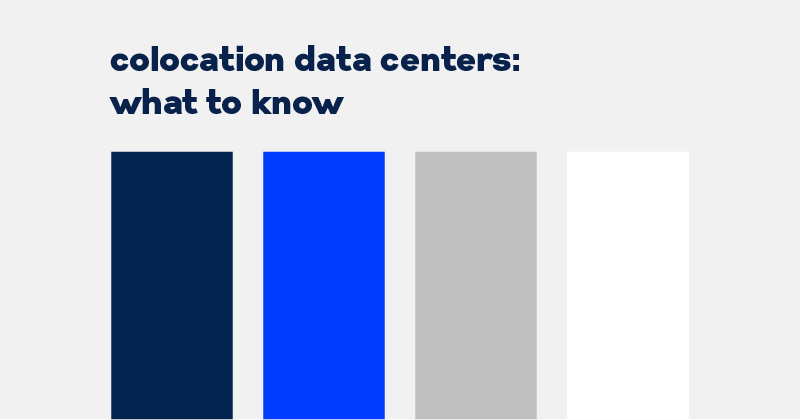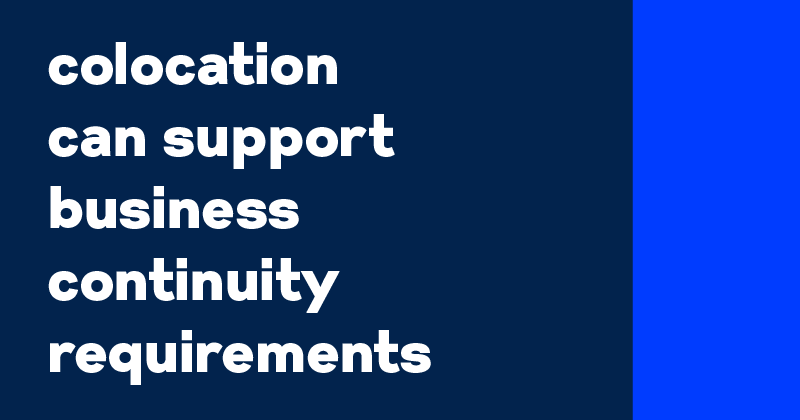What Is Colocation? An Overview for Businesses

Business needs change and technology is constantly evolving. Business owners are continually rethinking their IT strategies to meet customer needs. Making colocation part of your overall IT strategy provides a cost-effective option tailored to your business and its growth.
Colocation can provide peace of mind with an effective alternative to on-premises data centers. Knowing more about colocation and how it works can help you make strategic decisions about whether it’s right for your business.
What Is Colocation?
Colocation services are shared, secure environments businesses can use for storing hardware and network connectivity. Colocation services — also known as colo — often provide the building, power, physical security and bandwidth, so as the customer, all you need to do is provide the servers.
In addition to the abovementioned features, colo services can provide your business with a connection to network and telecommunication service providers with minimal cost and complication. Instead of building, maintaining and updating your own data center, a colo allows you to rent space in the facility to suit your business needs. Many colos also offer optional extras like managed services.
How Does Colocation Work?
In essence, your business can rent a physical space and colocate in a third-party data center instead of keeping your servers in-house or renting a private data center. You purchase your equipment and pay the colo provider for the space and resources in the third-party data center. Often, you’re responsible for configuring and maintaining your server, which allows you to maintain control of all the server settings.
One of the many reasons you choose colocation is to move away from traditional in-house hosting but retain the flexibility of managing your equipment. Many colo services provide constant IT support, so you can be confident your business will continue to run smoothly. You can rent the space based on your current requirements and scale up when needed.
What Are the Benefits of Colocation Services?
Colocation services can provide several benefits for your business, including the following:
- Reducing expenses: In-house data management can be expensive and time-consuming. Your business is responsible for all the costs and variables that must be maintained to keep everything running smoothly. As you’re outsourcing some of the necessary equipment, you can expect increased reliability and spend less time on technical emergencies and more on your core competencies.
- Maintaining flexibility: Using a colocation service lets you choose your servers and equipment to make the best decision for your business.
- Elevating security: Many colo services have an on-site IT support team and use the most innovative security measures to ensure your data remains safe. They employ the latest cyber security protocols to recover your data in the event of a breach, making them an integral part of data recovery plans for many businesses. Many colocations are strategically located away from your head office for an added layer of security.
- Improving connectivity: Colocation gives you abundant connectivity options without the cost of installing the cables and infrastructure to have the same levels in-house. You can choose from multiple Internet service and cloud providers to meet your speed and functionality needs.
- Enhanced scalability: If your business expands, a colo can keep up with your growth, making it quick and seamless. Your expansion doesn’t require the same capital expenditure as if you were making in-house expansions.
- Moving toward cloud migration: If migrating to the cloud is part of your long or short-term strategy, colocation provides a smooth transition . You can store your equipment in an off-site facility with increased capacity, supporting your business needs throughout the shift.
What Is a Colocation Data Center?
A colo data center is a secure physical location storing your servers and other equipment. Over the years, these centers have become increasingly more accessible for businesses of all sizes, with customizable services to suit various business needs. Each data center offers different services, but some of the primary benefits you can expect include the following:
- Equipment inspection, assembly and testing
- Consultation with trained IT specialists
- Inventory analysis
- Security and verification processes
Types of Colocation Data Center
The three main types of colocation centers include the following:
- Retail: This type of colocation is for any organization needing under 10 colocation racks or cabinets and less than 100 kilowatts of power. It’s a perfect option for businesses and start-ups.
- Wholesale: Wholesale clients require more space and power, so this type of colocation meets these needs. If you own a large enterprise, this option may suit your needs well.
- Hybrid cloud-based: Deploying colocation and the cloud provides quality connectivity and a flexible environment.
Choosing the type of data center depends on your unique business needs. Discussing your options with an expert before making your final choice is best.
Colocation vs. Traditional Hosting Methods
For many businesses, colocation provides more options than traditional housing methods. Small to medium enterprises (SMEs) can significantly benefit from what colocation services have to offer. Colocation services save you money and provider a greater return on investment (ROI) for the equipment you buy. Some other differences between the two methods include the following:
- Limited need for technical staff: A colo center will reduce your need for a sizeable on-site IT team.
- Enhanced reliability: Colo data centers have built-in fail-safes for redundancy, including backup generators, physical security and multiple network locations.
- Increased location flexibility: You can choose the colo in the most convenient location for your business.
- Predicted expenses: Signing a colocation service agreement outlines fixed monthly fees, making the budget much easier and less stressful.
What Is a Colocation Service Agreement?
A colocation service agreement is a legal contract between providers and customers. It outlines the conditions of your tenancy, each party’s responsibilities and the costs of the agreement. The contract is for a specific term, during which the provider will grant your business tenancy of a predetermined amount of space in the colocation center. Depending on the agreement, you’ll likely have the option to scale your space as your business expands.
Getting the best arrangement possible for your business is essential, so choosing a colo center that can meet your requirements and negotiating a mutually beneficial service agreement is necessary.
Tips for Negotiating a Colocation Service Agreement
As each business has unique needs, and colo service providers offer a range of optional services, many portions of a colocation service agreement are up for negotiation. As the signed agreement is legally binding, you and your service provider must be completely happy with it before you sign. Keep the following tips in mind for a mutually beneficial agreement:
- Ensure you know all the costs and requirements: As a business owner or manager, you need to know every detail about the total occupancy cost, including your deposit and monthly recurring and non-recurring charges. You must also understand what the agreement requires of you for the duration of your occupancy.
- Find out what is negotiable: Ask about tailoring your agreement to best suit your unique needs.
- Check your service level agreement carefully: Before signing the contract, you need to understand precisely what your potential service provider offers you. Feel free to ask questions to get clarification.
Let US Signal Walk You Through Your Colocation
Colocation has incredible benefits for businesses of all sizes, so if you’re considering the flexibility and cost-effectiveness of colocation for your business, trust US Signal to guide you through the process. Our 24/7/365 technical operations center supports each of our data centers, so we’re always available to answer your questions and appease any concerns.
If you want to learn more about US Signal data centers, visit our resource center for more information. Alternatively, please reach out to us , and let us help you achieve your business objectives today.



